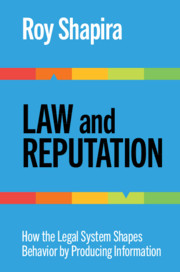Book contents
5 - Corporate Philanthropy as Signaling and Co-optation
from Part II - Applications
Published online by Cambridge University Press: 23 August 2020
Summary
Why do business companies donate to charity? Why do some companies donate more than others? The prevalent answers to these questions usually invoke reputation: companies donate in hope of securing good reputation among their stakeholders, or so the argument goes. Yet, the same problem we observed with the conventional wisdom on reputational sanctions appears here as well, with the conventional wisdom on reputational rewards: all too often legal scholars simply assume that donating to charity boosts a company’s reputation, without fully examining how reputational rewards work, or how the legal regime influences companies’ reputational incentives to donate.
Keywords
- Type
- Chapter
- Information
- Law and ReputationHow the Legal System Shapes Behavior by Producing Information, pp. 122 - 154Publisher: Cambridge University PressPrint publication year: 2020
- 1
- Cited by

